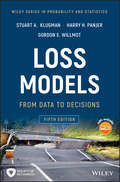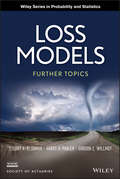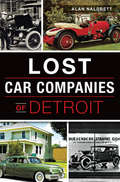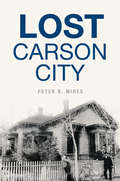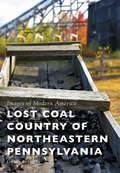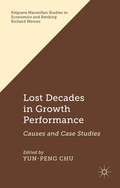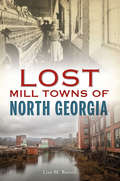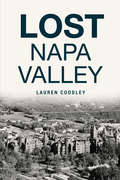- Table View
- List View
Loss Models: From Data to Decisions (Wiley Series in Probability and Statistics #977)
by Harry H. Panjer Stuart A. Klugman Gordon E. WillmotA guide that provides in-depth coverage of modeling techniques used throughout many branches of actuarial science, revised and updated Now in its fifth edition, Loss Models: From Data to Decisions puts the focus on material tested in the Society of Actuaries (SOA) newly revised Exams STAM (Short-Term Actuarial Mathematics) and LTAM (Long-Term Actuarial Mathematics). Updated to reflect these exam changes, this vital resource offers actuaries, and those aspiring to the profession, a practical approach to the concepts and techniques needed to succeed in the profession. The techniques are also valuable for anyone who uses loss data to build models for assessing risks of any kind. Loss Models contains a wealth of examples that highlight the real-world applications of the concepts presented, and puts the emphasis on calculations and spreadsheet implementation. With a focus on the loss process, the book reviews the essential quantitative techniques such as random variables, basic distributional quantities, and the recursive method, and discusses techniques for classifying and creating distributions. Parametric, non-parametric, and Bayesian estimation methods are thoroughly covered. In addition, the authors offer practical advice for choosing an appropriate model. This important text: • Presents a revised and updated edition of the classic guide for actuaries that aligns with newly introduced Exams STAM and LTAM • Contains a wealth of exercises taken from previous exams • Includes fresh and additional content related to the material required by the Society of Actuaries (SOA) and the Canadian Institute of Actuaries (CIA) • Offers a solutions manual available for further insight, and all the data sets and supplemental material are posted on a companion site Written for students and aspiring actuaries who are preparing to take the SOA examinations, Loss Models offers an essential guide to the concepts and techniques of actuarial science.
Loss Models: Further Topics (Wiley Series in Probability and Statistics #977)
by Harry H. Panjer Stuart A. Klugman Gordon E. WillmotAn essential resource for constructing and analyzing advanced actuarial models Loss Models: Further Topics presents extended coverage of modeling through the use of tools related to risk theory, loss distributions, and survival models. The book uses these methods to construct and evaluate actuarial models in the fields of insurance and business. Providing an advanced study of actuarial methods, the book features extended discussions of risk modeling and risk measures, including Tail-Value-at-Risk. Loss Models: Further Topics contains additional material to accompany the Fourth Edition of Loss Models: From Data to Decisions, such as: Extreme value distributions Coxian and related distributions Mixed Erlang distributions Computational and analytical methods for aggregate claim models Counting processes Compound distributions with time-dependent claim amounts Copula models Continuous time ruin models Interpolation and smoothing The book is an essential reference for practicing actuaries and actuarial researchers who want to go beyond the material required for actuarial qualification. Loss Models: Further Topics is also an excellent resource for graduate students in the actuarial field.
Loss Prevention at Mac’s Convenience Stores (A)
by Francesca Gino Olivia Hull Katherine DeCellesFaced with a persistent robbery problem at his convenience store company, Sean Sportun, security and loss prevention manager at Mac’s of Central Canada, looked to standardize safety measures and devise a new way of preventing employee injury. But as a 32-year old with just one year on the job, Sportun had to tailor his message for change carefully to his colleagues, many of whom had worked for Mac’s for decades. The case provides an overview of the convenience store industry and examines the challenges of crime prevention in a late-night retail environment.
Loss Prevention at Mac’s Convenience Stores (B)
by Francesca Gino Olivia Hull Katherine DeCellesSupplement to HBS No. 918-001. The case describes the inventive approaches to retail crime prevention that Sean Sportun, security and loss prevention manager at Mac’s Convenience Stores, implemented between 2007 and 2017.
Loss and Damage from Climate Change: Concepts, Methods and Policy Options (Climate Risk Management, Policy and Governance)
by Reinhard Mechler Swenja Surminski Laurens M. Bouwer Thomas Schinko JoAnne Linnerooth-BayerThis book provides an authoritative insight on the Loss and Damage discourse by highlighting state-of-the-art research and policy linked to this discourse and articulating its multiple concepts, principles and methods. Written by leading researchers and practitioners, it identifies practical and evidence-based policy options to inform the discourse and climate negotiations.With climate-related risks on the rise and impacts being felt around the globe has come the recognition that climate mitigation and adaptation may not be enough to manage the effects from anthropogenic climate change. This recognition led to the creation of the Warsaw International Mechanism on Loss and Damage in 2013, a climate policy mechanism dedicated to dealing with climate-related effects in highly vulnerable countries that face severe constraints and limits to adaptation. Endorsed in 2015 by the Paris Agreement and effectively considered a third pillar of international climate policy, debate and research on Loss and Damage continues to gain enormous traction. Yet, concepts, methods and tools as well as directions for policy and implementation have remained contested and vague.Suitable for researchers, policy-advisors, practitioners and the interested public, the book furthermore:• discusses the political, legal, economic and institutional dimensions of the issue• highlights normative questions central to the discourse• provides a focus on climate risks and climate risk management.• presents salient case studies from around the world.
Lost Brands - vom Aufstieg und Niedergang starker Marken: Warum "too big to fail" nicht einmal für Traditionsmarken gilt
by Michael Brückner Andrea PrzyklenkAuf dem Friedhof bekannter Firmen und Marken begegnet man vielen einstmals renommierten Namen. Einige stehen symbolhaft für das deutsche Wirtschaftswunder, andere für die Umsetzung kühner Ideen, wieder andere für spektakuläre Pleiten. Ihre Geschichten werden in diesem Buch erzählt - spannend, journalistisch und faktenreich. Der Leser begibt sich auf eine Reise durch die jüngere Wirtschaftsgeschichte. Am Ende eines jeden Kapitels wird analysiert, welche Gründe zum Untergang führten - und welche Schlüsse Unternehmer und Markenverantwortliche daraus ziehen können.
Lost Car Companies of Detroit (Lost)
by Alan NaldrettAmong more than two hundred auto companies that tried their luck in the Motor City, just three remain: Ford, General Motors and Chrysler. But many of those lost to history have colorful stories worth telling. For instance, J.J. Cole forgot to put brakes in his new auto, so on the first test run, he had to drive it in circles until it ran out of gas. Brothers John and Horace Dodge often trashed saloons during wild evenings but used their great personal wealth to pay for the damage the next day (if they could remember where they had been). David D. Buick went from being the founder of his own leading auto company to working the information desk at the Detroit Board of Trade. Author Alan Naldrett explores these and more tales of automakers who ultimately failed but shaped the industry and designs putting wheels on the road today.
Lost Carson City (Lost)
by Peter B. MiresCarson City has the distinction of being one of the least populated state capitals in the nation, but its contributions to Nevada's history are anything but diminutive. Set against the backdrop of the Sierra Nevada Mountains, it's a quintessential Wild West town. The gold and silver riches of the nearby Comstock Lode left a legacy that includes the Carson City Mint, one of only nine mints ever to exist in the United States, and the Virginia & Truckee Railroad, which still snakes through the hills. Residents once flocked to the Carson Opera House to take in a show and to the local racetrack to bet on the horses. Author Peter B. Mires explores the city's legacies, brick by locally quarried sandstone brick.
Lost Chicago Department Stores (Landmarks)
by Leslie GoddardWithin thirty years of the Great Chicago Fire, the revitalized city was boasting some of America's grandest department stores. The retail corridor on State Street was a crowded canyon of innovation and inventory where you could buy anything from a paper clip to an airplane. Revisit a time when a trip downtown meant dressing up for lunch at Marshall Field's Walnut Room, strolling the aisles of Sears for Craftsman tools or redeeming S&H Green Stamps at Wieboldt's. Whether your family favored The Fair, Carson Pirie Scott, Montgomery Ward or Goldblatt's, you were guaranteed stunning architectural design, attentive customer service and eye-popping holiday window displays. Lavishly illustrated with photographs, advertisements, catalogue images and postcards, Leslie Goddard's narrative brings to life the Windy City's fabulous retail past.
Lost Coal Country of Northeastern Pennsylvania (Images of Modern America)
by Lorena BeniquezLost Coal Country of Northeastern Pennsylvania documents the region’s disappearing anthracite history, which shaped the legacy of the United States of America and the industrial revolution. The coal mines, breakers, coal miners’ homes, and railroads have all steadily disappeared. With only one coal breaker left in the entire state, it was time to record what would soon be lost. Unfortunately, one piece of history that persists is underground fires that ravage communities like Centralia. Blazing for over 50 years, the flames of Centralia will not be doused anytime soon. Images featured in the book include the St. Nicholas coal breaker, Huber coal breaker, Steamtown National Historic Site, Lackawanna Coal Mine Tour, Eckley Miners’ Village, Centralia, and the Knox Mine disaster. A hybrid history book and travel guide, Lost Coal Country of Northeastern Pennsylvania is one final recounting of what is gone and what still remains.
Lost Dayton, Ohio (Lost)
by Andrew WalshMany of the places that helped make Dayton a center of innovation were lost to history, while others survived and adapted, representing the city's spirit of revitalization. Some of the city's distinctive and significant structures, such as Steele High School and the Callahan Building, were demolished, while others, including the Arcade and Centre City Building, saw hard times but now await redevelopment. Entire neighborhoods, such as the Haymarket, and commercial districts, such as West Fifth Street, vanished and show no traces of their past. Others, including the popular Oregon District, narrowly escaped the wrecking ball. From the Wright Brothers Factory to the park that hosted the first NFL game, Andrew Walsh explores the diverse selection of retail, industrial, entertainment and residential sites from Dayton's disappearing legacy.
Lost Dearborn (Lost)
by Craig E. HutchisonThroughout its existence, Dearborn has been a pioneer settlement, a multicultural hub, a college town, a major tourism center and a world-renowned industrial city. Unfortunately, due to a variety of factors, significant structures have been lost to time. Almost all of the eleven U.S. Arsenal complex buildings have disappeared since the arsenal was closed in 1875. The hallways of the Edison School and Oxford School still live on in the hearts of their students but were razed long ago. Even beloved edifices such as the Ford Rotunda and the Ford Motor Company Administration building, built by Dearborn's favorite son, Henry Ford, are now only a memory. Author Craig E. Hutchison endeavors to immortalize the important foundational building blocks of an evolving city.
Lost Decades in Growth Performance
by Yun-Peng ChuThere have been many noticeable incidents of 'lost decades' in economic growth, occurring in countries across the world. It has been found that in many economies, the lost decade phenomenon persists, even after the conventional set of contributing factors such as per capita income, fertility rate, life expectancy, rule of law, educational attainment, ratio of investment to national income, and openness have been taken into account. This book explains where and how these lost decades in economic growth occur in the world. The authors identify that dominant macroeconomic factors contributing to their occurrence are an abnormal supply of credits relative to national income, and poor demand management. The study pays special attention to the cases of Japan, South Korea and Taiwan, exploring their specific cases and analyzing contributing factors. While Japan suffered from excessive credit prior to the bubble bursting, and from insufficient domestic demand subsequently, Korea's growth has been stunted through structural imbalances between and within industries, as well as through changes in the orientation of public policies from growth to equality. Adversely, reduced economic growth in Taiwan has led from its populism-ridden democracy and mass media, as well as from internal disputes over national identity. Lost Decades in Growth Performance provides a revealing insight into the factors affecting economic growth across the world, and will be an invaluable resource for anyone with an interest in global and Asian economics. It also offers a fundamental source of reference for students and academics in general equilibrium models, economic development and East Asian economies.
Lost Decades: The Making of America's Debt Crisis and the Long Recovery
by Jeffry A. Frieden Menzie D. ChinnA clear, authoritative guide to the crisis of 2008, its continuing repercussions, and the needed reforms ahead. The U.S. economy lost the first decade of the twenty-first century to an ill-conceived boom and subsequent bust. It is in danger of losing another decade to the stagnation of an incomplete recovery. How did this happen? Read this lucid explanation of the origins and long-term effects of the recent financial crisis, drawn in historical and comparative perspective by two leading political economists. By 2008 the United States had become the biggest international borrower in world history, with more than two-thirds of its $6 trillion federal debt in foreign hands. The proportion of foreign loans to the size of the economy put the United States in league with Mexico, Indonesia, and other third-world debtor nations. The massive inflow of foreign funds financed the booms in housing prices and consumer spending that fueled the economy until the collapse of late 2008. This was the most serious international economic crisis since the Great Depression of the 1930s. Menzie Chinn and Jeffry Frieden explain the political and economic roots of this crisis as well as its long-term effects. They explore the political strategies behind the Bush administration's policy of funding massive deficits with foreign borrowing. They show that the crisis was foreseen by many and was avoidable through appropriate policy measures. They examine the continuing impact of our huge debt on the continuing slow recovery from the recession. Lost Decades will long be regarded as the standard account of the crisis and its aftermath.
Lost Department Stores of Denver (Lost)
by Mark A. BarnhouseDenverites once enjoyed a retail landscape rich with personal touches. Revisit May-D&F's animated holiday windows or the ice skating rink in front of the store. Reminisce about the Christmas chandeliers that stretched for four hundred feet on the main floor of the Denver Dry Goods or the elegance of Neusteters, with its fashion shows and exclusive merchandise. Recall finding that perfect outfit at Fashion Bar and going back-to-school shopping at Joslins. Celebrate salespeople who remembered your name and the comforting feeling of shopping locally where your parents and grandparents shopped. Through decades of research and interviews with former staff, Denver's unofficial "department store historian" Mark Barnhouse assembles the ultimate mosaic of the Mile High City's fabulous retail past.
Lost Department Stores of San Francisco (Landmarks)
by Anne Evers HitzIn the late nineteenth century, San Francisco's merchant princes built grand stores for a booming city, each with its own niche. For the eager clientele, a trip downtown meant dressing up--hats, gloves and stockings required--and going to Blum's for Coffee Crunch cake or Townsend's for creamed spinach. The I. Magnin empire catered to a selective upper-class clientele, while middle-class shoppers loved the Emporium department store with its Bargain Basement and Santa for the kids. Gump's defined good taste, the City of Paris satisfied desires for anything French and edgy, youth-oriented Joseph Magnin ensnared the younger shoppers with the latest trends. Join author Anne Evers Hitz as she looks back at the colorful personalities that created six major stores and defined shopping in San Francisco.
Lost Flint (Lost)
by Gary FlinnThe city of Flint waxed and waned with the automotive industry of the twentieth century. Where they have not vanished completely, crumbling signs of past opulence stand as painful reminders of more recent struggles. Hardly a trace remains of the Buick City factory complex that sprawled across the city's north side. The placid waters of Flint Park Lake once echoed with the sounds of an amusement park--games, dancing, circus acts and even a roller coaster. Flint Community Schools pioneered a model for how schools can function outside regular hours, but too many now are closed and deteriorating. Local author Gary Flinn uncovers the abandoned places and lost traditions from the Vehicle City's past.
Lost Gulfport (Lost)
by John CuevasThe second largest city in the state, Gulfport is the business center of south Mississippi. Many of the city's cherished landmarks and businesses have been lost to Hurricanes Camille and Katrina, the development of shopping malls and Interstate 10. Gulfport's answer to the quintessential '50s malt shop, Stone's Ice Cream, became a favorite hangout for students, families and businessmen throughout its long history. The Paramount Theatre was famous for its annual Christmas raffle during the '50s. Known as the "Hosts of the Gulf Coast," the Friendship House Restaurant served up a great cup of coffee along with its celebrated Hospitality Menu. Historian John Cuevas takes a look back at Gulfport's shops, restaurants, nightclubs, cinemas and more from a bygone age.
Lost Inwood (Images of America)
by Cole Thompson Don RiceInwood, the northernmost neighborhood of Manhattan, has a rich yet little-known history. For centuries, the region remained practically unchanged--a quaint, country village known to early Dutch settlers as Tubby Hook. The subway's arrival in the early 1900s transformed the area, once scorned as "ten miles from a beefsteak," from farm to city virtually overnight. The same construction boom sparked an age of neighborhood self-discovery, when vestiges of the past--in the form of mastodon bones, arrowheads, colonial pottery, Revolutionary War cannonballs, and forgotten cemeteries--emerged from the earth. Waves of German, Irish, and Dominican immigrants subsequently produced a vibrant urban oasis with a big-city/small-town feel. Inwood has also been home to wealthy country estates, pre-integration sports arenas, and a lively waterfront culture. Famous residents have included NBA legend Kareem Abdul-Jabbar, Basketball Diaries author Jim Carroll, and Hamilton creator/star Lin-Manuel Miranda.
Lost Mill Towns of North Georgia (Lost)
by Lisa M. RussellThe textile era was born of a perfect storm. When North Georgia's red clay failed farmers and prices fell during Reconstruction, opportunities arose. Beginning in the 1880s, textile industries moved south. Mill owners enticed an entire workforce to leave their farms and move their families into modern mill villages, encased communities with stores, theaters, baseball teams, bands and schools. To some workers, mill village life was idyllic. They had work, recreation, education, shopping and a home with the modern conveniences of running water and electricity. Most importantly, they got a paycheck. But after the New Deal, workers started to see the raw deal they were getting from mill owners and rebelled. Strikes and economic changes began to erode the era of mill villages, and by the 1960s, mill village life was all but gone. Author Lisa Russell brings these once-vibrant communities back to life.
Lost Mill Village of Middlesex Fells, The (Brief History)
by Alison C. Simcox Douglas L. HeathOne of the earliest mill communities in the Massachusetts Bay Colony formed along Spot Pond Brook, a few miles north of Boston. Thomas Coytmore built the first mill in 1640 at the brook’s downstream end in “Mistick Side” (present-day Malden). Other mills sprang up along the brook as well. Today, most of Spot Pond Brook is hidden in culverts beneath the busy streets of Malden and Melrose. However, remnants of the lost mill village of Haywardville—foundations, millruns and ponds and waterfalls—are preserved within Middlesex Fells Reservation, part of Boston’s world-famous Metropolitan Park System. Authors Douglas L. Heath and Alison C. Simcox trace the history of this thriving early American community.
Lost Mills of Fulton County (Lost)
by Lisa M. RussellLabor conflicts, arrests, espionage—it was all there at the once ubiquitous mills of Fulton County.Employee records and snatches of paper prove workers spied on each other. Company owners were paranoid about labor unions taking over. Copious documentation, unearthed here by author Lisa M. Russell, brings the workaday drama back to life. These mills sustained families, but exploitation was far from uncommon. When mill workers finally went on strike, there was hell to pay. The company bosses yanked strikers from their shacks. With the help of Governor Talmadge, the National Guard arrested working women with their children. They marched these "criminals" to a former WWI prisoner of war camp that once held enemy German soldiers. Hard to believe this was happening in and around Atlanta in the early 1900s.
Lost Napa Valley (Lost)
by Lauren CoodleyNapa Valley, once known for its cattle and silver mines, has grown into an international wine destination. On the way, many buildings and institutions have vanished. From the Von Uhlit family's fruit farm in Napa to the Wheeler Ranch in St. Helena, fields and orchards became neighborhoods and vineyards. The Dolphin, a steamboat that once delivered travelers from San Francisco, was replaced by faster transport, and the Napa State Hospital's original "castle" was demolished. The Sawyer Tannery, in operation for over one hundred years, closed its doors in 1990, and destinations like the Kay Von Drive-In and the Bel Aire Bowl now live on only in memory. Join author and historian Lauren Coodley as she celebrates these once-beloved landmarks in California's Wine Country.
Lost Omaha (Lost)
by Janet R. BednarekThe landmarks of Omaha's past reveal a history of industry, innovation and change. The Hotel Fontenelle, the Omaha Athletic Club and the Medical Arts Building disappeared in the wake of changes remaking downtown after World War II. Jobbers Canyon, a vital part of the city's wholesale district, was sacrificed to ConAgra's headquarters. Peony Park closed as suburban sprawl prevented its expansion, and changing leisure patterns took residents farther away for their amusement park experience. The stockyards finally closed in 1999, ending a long chapter in Omaha's history. Author and historian Janet R. Daly Bednarek charts the legacy of Omaha's lost history through its landmarks.
Lost Portland, Oregon (Lost)
by Val C. BallestremAs Portland has grown and changed, so has its architectural landscape. Once prominent landmarks have disappeared--the Marquam Building collapsed during 1912 renovations, the massive chamber of commerce building became a parking lot and the Corbett Building became a shopping mall. The city skyline was shaped by architects like Justus F. Krumbein and David L. Williams, only to drastically change in the face of urban renewal and the desire for modernization. Discover the stories behind some of Portland's most iconic buildings, including the Beth Israel Synagogue and the first East Side High School, both lost to fire. Join historian Val C. Ballestrem as he explores the city's architectural heritage from the 1890s to the present, as well as the creative forces behind it.
